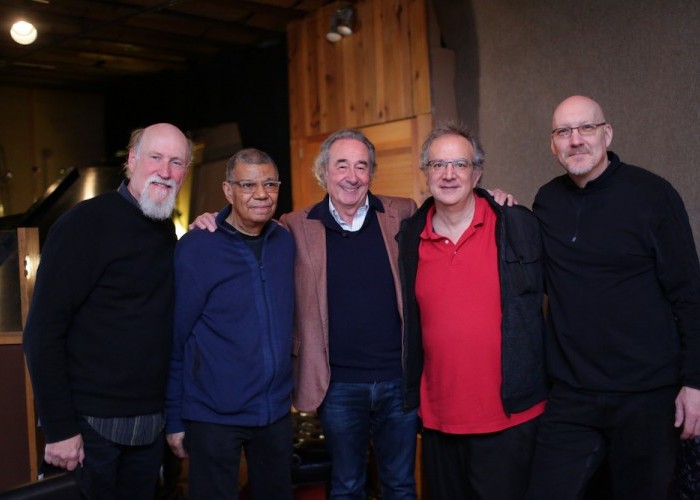Jan 13, 2026 2:09 PM
More Trump-Kennedy Center Cancellations
The fallout from the renaming of the John F. Kennedy Center for the Performing Arts to include President Donald…

John Scofield (left), Jack DeJohnette, Franco Ambrosetti, Uri Caine and Scott Colley at the recording session for Long Waves
(Photo: John Abbott)In a 1987 interview, Miles Davis sat down with a German journalist and discussed the differences between black and white jazz musicians. As expected, Davis had very strong opinions on the matter of phrasing, while commenting on the merits of Keith Jarrett, David Sanborn, Joe Wilder and others. And then he said, “There’s a good trumpet player in George Gruntz’s band I heard at the Berlin Jazz Festival. He can play his ass off. If I was picking a trumpet player, I would pick him. He can play anything.”
Davis was talking about Franco Ambrosetti, the renowned Swiss trumpeter, now 76. Still swinging after all these years, Ambrosetti’s recent projects include a memoir and a new album, Long Waves (Unit), his 28th as a leader. Accompanied by an all-star band—guitarist John Scofield, pianist Uri Caine, bassist Scott Colley and drummer Jack DeJohnette—the disc is a crowning achievement in Ambrosetti’s long career. Recorded at New York’s Sear Sound Studio, Ambrosetti’s dream team reveals rare chemistry on a sublime reading of the poignant ballad “Old Folks” and a burning “On Green Dolphin Street,” along with Ambrosetti originals like his tango-flavored “Milonga” and two swinging numbers named for his wife of 22 years, “Silli’s Waltz” and “Silli’s Long Wave.”
“I felt like I played with this group for the last five years,” the trumpeter said during a break in the late-January recording session. “We are playing together, listening and reacting. It’s not that everybody is playing his own thing, no. It’s more like a constant dialogue.”
“I thought this was the most successful thing that I’ve done with Franco,” added Scofield, who played on Ambrosetti’s popular 1987 album, Movies, and the 1988 sequel, Movies Too, and also on 2018’s Cheers (Enja). “I have a real affinity with Franco’s playing. The stuff that he chooses to play, in terms of the lines and the rhythm, feels like home to me.”
Born in Lugano, Switzerland, on Dec. 10, 1941, Ambrosetti inherited his love of jazz from his saxophone-playing father, Flavio, who founded the first jazz club in his hometown, organized the first jazz festival in Lugano and also played opposite Charlie Parker at the 1949 Paris Jazz Festival. “Jazz is in my DNA,” Ambrosetti said.
Beginning in 1962, when he joined his father’s band, Ambrosetti toured frequently throughout Europe before playing his first concert in the United States at the 1967 Monterey Jazz Festival with the Flavio Ambrosetti All-Stars, featuring pianist George Gruntz, drummer Daniel Humair, bassist Niels-Henning Ørsted Pedersen and violinist Jean-Luc Ponty. Through the ’70s, he led his own groups, while most of his recordings during the ’80s and ’90s were done in New York with a long list of esteemed players on the Big Apple scene.
In 2008, Ambrosetti participated in a Quincy Jones jubilee held at the Montreux Jazz Festival, where he recreated classic Gil Evans–Miles Davis collaborations with a sublime take on “My Ship” (from Miles Ahead) and a soulful muted trumpet reading of “Summertime” (from Porgy And Bess). And while he might have patterned himself after bop trumpeters Clifford Brown and Lee Morgan in his formative years, the influence of Davis’ singular trumpet playing was evident in Ambrosetti’s emotive performances on these two pieces (captured in multiple formats on Quincy Jones: The 75th Birthday Celebration), as well as on his lavish orchestral project from 2018, The Nearness Of You (Unit).
“From listening to Miles, especially on ballads, I learned how to really play a melody,” he said. “Miles showed me how you stretch the notes out, like you’re really singing or crying. And I think I can express my feelings better that way.”
Though he was engaged for decades in various aspects of the family business—the Ambrosetti companies have been involved in manufacturing steel wheels for cars and landing gear for aircraft—Franco never put his horn on the shelf. “Trumpet is an instrument that you have to practice every day or your chops are gone,” he said. “There are trumpeters who practice four, five hours a day, which I think this is too much. But I do manage to play every day of my life.” DB

Belá Fleck during an interview with Fredrika Whitfield on CNN.
Jan 13, 2026 2:09 PM
The fallout from the renaming of the John F. Kennedy Center for the Performing Arts to include President Donald…

Peplowski first came to prominence in legacy swing bands, including the final iteration of the Benny Goodman Orchestra, before beginning a solo career in the late 1980s.
Feb 3, 2026 12:10 AM
Ken Peplowski, a clarinetist and tenor saxophonist who straddled the worlds of traditional and modern jazz, died Feb. 2…

The success of Oregon’s first album, 1971’s Music Of Another Present Era, allowed Towner to establish a solo career.
Jan 19, 2026 5:02 PM
Ralph Towner, a guitarist and composer who blended multiple genres, including jazz — and throughout them all remained…

Rico’s Anti-Microbial Instrument Swab
Jan 19, 2026 2:48 PM
With this year’s NAMM Show right around the corner, we can look forward to plenty of new and innovative instruments…

Richie Beirach was particularly renowned for his approach to chromatic harmony, which he used to improvise reharmonizations of originals and standards.
Jan 27, 2026 11:19 AM
Richie Beirach, a pianist and composer who channeled a knowledge of modern classical music into his jazz practice,…